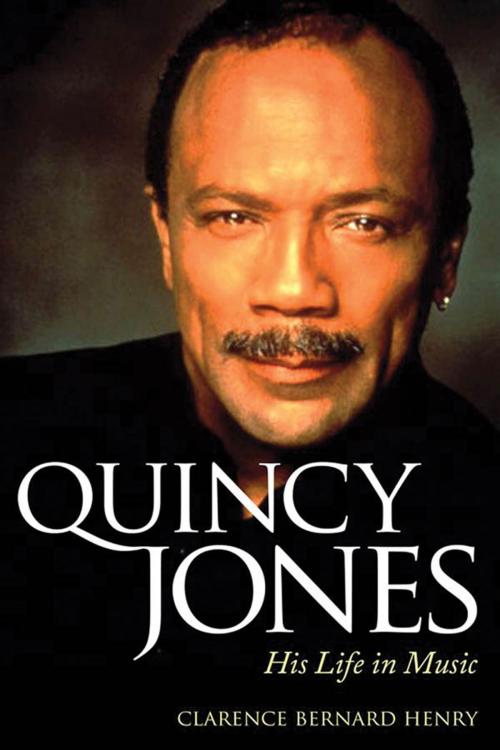Quincy Jones
His Life in Music
Nonfiction, Entertainment, Music, Theory & Criticism, History & Criticism, Reference, Biography & Memoir, Composers & Musicians| Author: | Clarence Bernard Henry | ISBN: | 9781617038624 |
| Publisher: | University Press of Mississippi | Publication: | September 4, 2013 |
| Imprint: | University Press of Mississippi | Language: | English |
| Author: | Clarence Bernard Henry |
| ISBN: | 9781617038624 |
| Publisher: | University Press of Mississippi |
| Publication: | September 4, 2013 |
| Imprint: | University Press of Mississippi |
| Language: | English |
Quincy Jones (b. 1933) is one of the most prolific composers, arrangers, bandleaders, producers, and humanitarians in American music history and the recording and film industries. Among pop music fans he is perhaps most famous for producing Michael Jackson's album, Thriller. Clarence Bernard Henry focuses on the life, music, career, and legacy of Jones within the social, cultural, historical, and artistic context of American, African American, popular, and world music traditions.
Jones's career has spanned over sixty years, generating a substantial body of work with over five hundred compositions and arrangements. The author focuses on this material as well as many of Jones's accomplishments: performing as a young trumpeter in the bands of Lionel Hampton and Dizzy Gillespie, becoming the first African American to hold an executive position in the competitive white-owned recording industry, breaking racial barriers as a composer in the Hollywood film and television industries, producing the best-selling album of all time, and receiving numerous Grammy Awards.
The author also discusses many of Jones's compositions, arrangements, and recordings and his compositional study in France with legendary teacher Nadia Boulanger. In addition, details are provided about Jones's distinct ability as one of the most innovative composers and arrangers who incorporates many different styles of music, techniques, and creative ideas in his compositions, arrangements, and film scores. He collaborated with an array of musicians and groups such as Louis Armstrong, Duke Ellington, Miles Davis, Ella Fitzgerald, Sarah Vaughan, Frank Sinatra, Clifford Brown, Ray Charles, Michael Jackson, USA for Africa, and many others. Clarence Bernard Henry shows how Jones has, throughout his career, wholeheartedly embraced philosophies of globalization and cultural diversity in his body of work, collaborations, humanitarian projects, and musical creativity.
Quincy Jones (b. 1933) is one of the most prolific composers, arrangers, bandleaders, producers, and humanitarians in American music history and the recording and film industries. Among pop music fans he is perhaps most famous for producing Michael Jackson's album, Thriller. Clarence Bernard Henry focuses on the life, music, career, and legacy of Jones within the social, cultural, historical, and artistic context of American, African American, popular, and world music traditions.
Jones's career has spanned over sixty years, generating a substantial body of work with over five hundred compositions and arrangements. The author focuses on this material as well as many of Jones's accomplishments: performing as a young trumpeter in the bands of Lionel Hampton and Dizzy Gillespie, becoming the first African American to hold an executive position in the competitive white-owned recording industry, breaking racial barriers as a composer in the Hollywood film and television industries, producing the best-selling album of all time, and receiving numerous Grammy Awards.
The author also discusses many of Jones's compositions, arrangements, and recordings and his compositional study in France with legendary teacher Nadia Boulanger. In addition, details are provided about Jones's distinct ability as one of the most innovative composers and arrangers who incorporates many different styles of music, techniques, and creative ideas in his compositions, arrangements, and film scores. He collaborated with an array of musicians and groups such as Louis Armstrong, Duke Ellington, Miles Davis, Ella Fitzgerald, Sarah Vaughan, Frank Sinatra, Clifford Brown, Ray Charles, Michael Jackson, USA for Africa, and many others. Clarence Bernard Henry shows how Jones has, throughout his career, wholeheartedly embraced philosophies of globalization and cultural diversity in his body of work, collaborations, humanitarian projects, and musical creativity.















